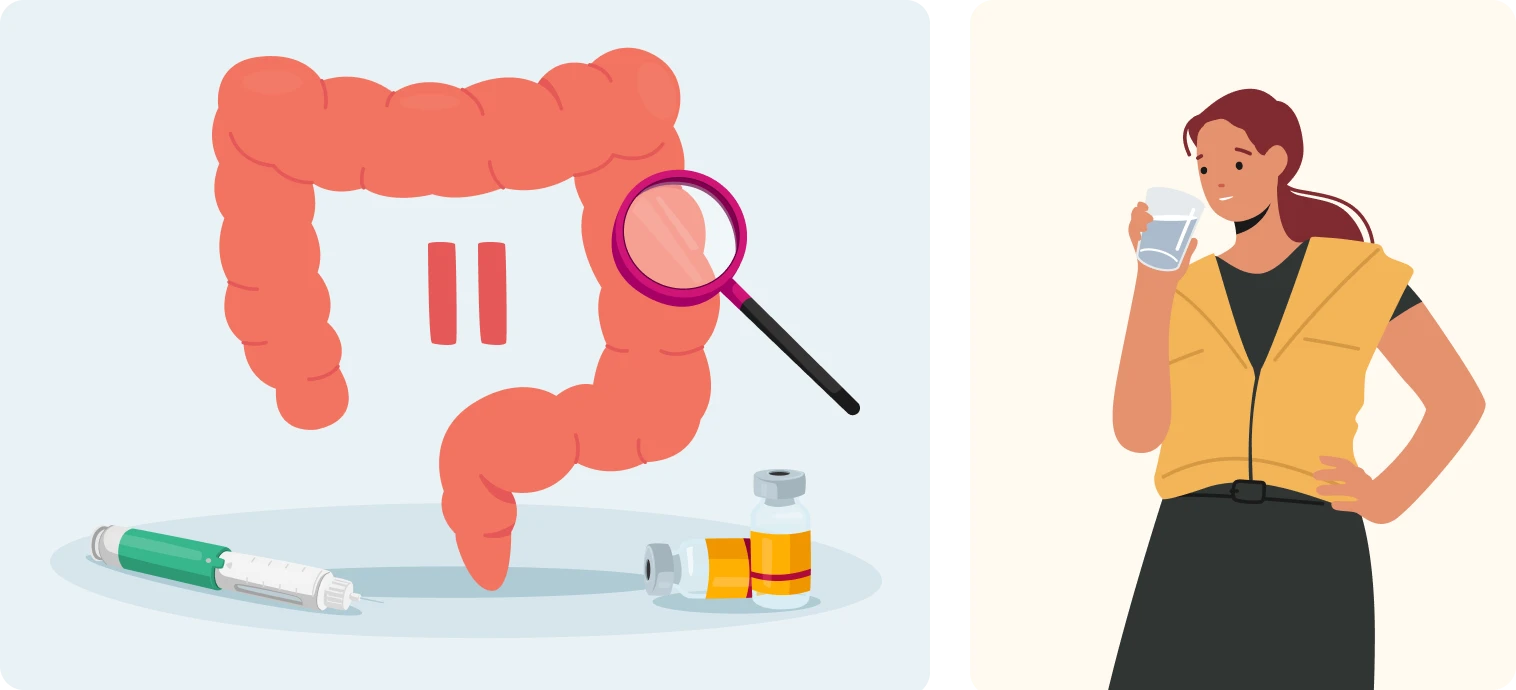Constipation is a common side effect of weight management and diabetes medications like semaglutide (Wegovy) and tirzepatide (Mounjaro). Many people taking these GLP-1 receptor agonist injections notice their bathroom habits changing. When constipated, your bowel movements become less frequent and harder to pass.
Why does this happen? These medications work partly by slowing down your digestive system. Food takes longer to move through your stomach and intestines. During this extended journey, your body absorbs more water from waste material. The result? Harder, drier stools that are difficult to pass.
Understanding this connection can help you take steps to manage this side effect while continuing your treatment.

Common symptoms
- Fewer than three bowel movements per week
- Hard, dry, or lumpy stools
- Straining during bowel movements
- Sensation of incomplete emptying of bowels
- Abdominal discomfort, bloating, or cramping
- Feeling of fullness or pressure in the rectum
- Possible nausea or reduced appetite
How common is constipation with GLP-1 treatments?
Constipation is reported less frequently than nausea or diarrhoea in clinical trials, nevertheless it remains a significant and sometimes persistent concern in real-world use. The risk is highest during the early stages of treatment and after dose increases, though it can linger longer for some patients.
Managing constipation whilst on GLP-1 treatments
Dietary strategies
- Increase fibre intake gradually to 25-30g daily through fruits, vegetables, whole grains, and legumes
- Stay well-hydrated with at least 2-3 litres of water daily
- Consider psyllium husk or other soluble fibre supplements if dietary fibre is insufficient
- Magnesium supplements can have a laxative effect and relieve constipation
- Include probiotic-rich foods like yoghurt, kefir and fermented vegetables
- Limit foods that may worsen constipation such as processed foods, cheese, and white bread
Physical activity approaches
- Try specific yoga poses known to stimulate digestive motility
- Practice abdominal massage in a clockwise direction
- Maintain an active lifestyle with regular movement throughout the day and at least 30 minutes regular exercise
- Consider a short walk after meals to stimulate digestion
Bathroom habits
- Establish a regular toileting routine at the same time each day
- Don’t ignore the urge to have a bowel movement
- Use proper positioning with knees higher than hips (a footstool can help)
- Allow sufficient unhurried time in the bathroom
- Practice relaxation techniques to reduce tension during bowel movements
Medical interventions
- Over-the-counter osmotic laxatives like polyethylene glycol (Movicol) for occasional relief
- Stool softeners such as docusate sodium (Dioctyl) if stools are particularly hard
- Bulk-forming laxatives such as ispaghula husk (Fybogel).
- Discuss with your clinician about adjusting your GLP-1 dosing schedule if constipation is severe
- Consider prescription medications for persistent constipation that doesn’t respond to other measures
When to seek medical advice
Contact your healthcare provider if you experience:
- No bowel movement for more than 4-5 days
- Severe abdominal pain or distension
- Blood in the stool
- Constipation alternating with diarrhoea
- Unexplained weight loss or fatigue
- Constipation that doesn’t improve with self-management strategies
Long-term outlook
For most patients, constipation either resolves as the body adjusts to GLP-1 therapy or can be effectively managed with dietary and lifestyle modifications. Most patients experiencing constipation reported significant improvement with appropriate interventions, particularly increased fibre and fluid intake.
FAQs
Will constipation affect my weight loss results? Constipation may cause temporary fluctuations in scale weight due to retained stool, but it does not significantly impact the fat-loss benefits of GLP-1 medications.
Can constipation lead to complications if left untreated? Yes, chronic constipation can potentially lead to haemorrhoids, anal fissures, faecal impaction, or rectal prolapse, making it important to address symptoms promptly.
Should I stop taking my medication if I experience constipation? Do not discontinue your medication without consulting your healthcare provider. In most cases, constipation can be managed effectively whilst continuing treatment.
Are some GLP-1 medications less likely to cause constipation than others? There are some differences in side effect profiles between various GLP-1 medications, but individual responses vary considerably. Discuss with your healthcare provider if you’re experiencing significant problems.
Can I take fibre supplements and laxatives together? It’s generally safe to combine fibre supplements with gentle osmotic laxatives, but always space them apart by at least 2 hours and consult your healthcare provider for personalised advice.





























